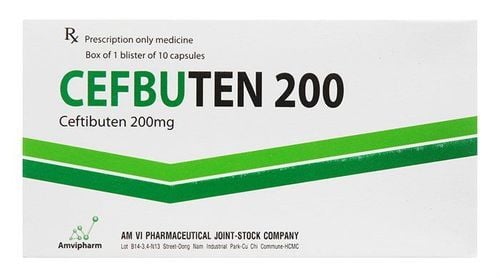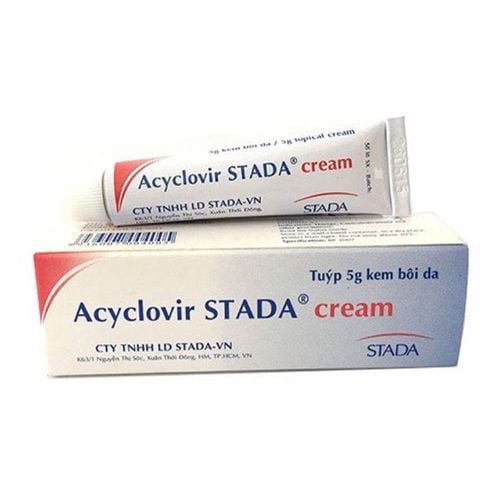This is an automatically translated article.
Atiganci is commonly prescribed for the treatment and prevention of diseases caused by human immunodeficiency virus infections. To use Atiganci effectively and prevent the risk of side effects, patients need to strictly follow the doctor's instructions about the dose and duration of treatment with the drug.
1. What is Atiganci?
Atiganci is a drug used to treat and prevent Cytomegalovirus (CMV) disease in people with weakened immune systems. In addition, Atiganci is also used to treat certain other diseases such as pneumonia, retinitis, esophagitis or colon infection caused by Cytomegalovirus infection.
Atiganci drug is manufactured by An Thien Pharmaceutical Joint Stock Company - Vietnam with the dosage form of lyophilized powder for injection. Atiganci belongs to the group of antiviral drugs, packaged in a box of 1 vial with 1 ampoule of 10ml distilled water for injection. In each vial of Atiganci, the main ingredient is Ganciclovir 500mg along with other excipients.
2. What effect does Atiganci have?
2.1. The use of Atiganci drug The main active ingredient Ganciclovir in Atiganci brand name drug is a synthetic Nucleoside structurally similar to Aciclovir. According to experts, Ganciclovir is effective against Herpes simplex virus type I (HSV1), type 2 (HSV2), human giant cell virus (CMV) and some other viruses. The active ingredient Ganciclovir is usually metabolized in the form of Ganciclovir Monophosphate by Deoxyguanosine Kinase or Enzyme Thymidine Kinase. Subsequently, Ganciclovir Monophosphate will be further metabolized to the active Triphosphate and Disphosphate forms.
According to the study, the concentration of Ganciclovir Triphosphate metabolite is 100 times higher in the cells infected with the giant cell virus than in the uninfected cells. This shows that Phosphorylation is more likely to occur in virus-infected cells.
In addition, Ganciclovir Triphosphate also has the ability to inhibit the synthesis of viral DNA through the effect of inhibiting DNA Polymerase as well as merging into the DNA of the virus. This process usually takes place selectively in cells infected with the virus.
2.2. Indications for use of Atiganci Currently, Atiganci drugs are often prescribed by doctors to treat the following conditions:
Support for the treatment of conditions related to cytomegalovirus infection, such as retinitis. , pneumonia , esophagitis or colitis in immunocompromised patients. Prevents the risk of infection with cytomegalovirus (CMV) in patients whose immune systems are suppressed by medication, such as after cancer chemotherapy or after organ transplantation. 2.3. Contraindication to the use of Atiganci drug Atiganci should not be used for the following subjects without the approval of a doctor:
Patients with a history of allergy or hypersensitivity reaction to the active ingredient Ganciclovir, Aciclovir or any excipients other in the drug. Atiganci should not be used in patients with absolute neutrophil counts < 500/mm3 and platelet counts < 25000/mm3. Atiganci is contraindicated for women who are pregnant or breastfeeding.
3. Dosage and instructions for use of Atiganci
3.1. Dosage of Atiganci The following is the dosage of Atiganci drug according to the general recommendations of the doctor:
Initial dose: Use 5mg/kg body weight/ 12 hours by slow intravenous infusion. Treat for 2-3 weeks, then apply a maintenance dose. Maintenance dose: Use 5mg/kg body weight/time/day and treat for 1 week, or use maintenance dose 6mg/kg body weight/day, treat for 5 days. In addition to intravenous infusion, Atiganci can also be administered orally with a maintenance dose of 100mg × 3 times/day. For patients on maintenance therapy but with severe progression or recurrence of cytomegalovirus retinitis, another course of Atiganci should be initiated intravenously as in the previous treatment. starting value. Prophylactic dose of cytomegalovirus infection for patients with end-stage HIV with normal renal function: Oral 100mg × 3 times/day. Dose for prevention of cytomegalovirus infection for organ transplant recipients with normal renal function: The initial dose and maintenance dose are similar to the treatment of retinitis, except for the initial course of 1-2 weeks. The duration of maintenance dose of Atiganci will be determined based on clinical symptoms as well as the degree of immunosuppression of the patient. For organ transplant recipients who are seropositive for the virus, they will need to be treated for at least 1 month with Atiganci. For patients with renal failure, the therapeutic dose of Atiganci will be determined based on the level of creatinine clearance, specifically:
Creatinine clearance from 50 to 69ml/min: Take 1500mg/time/day or equally divided 3 times/day, 500mg each time. Creatinine clearance from 25 to 49ml/min: Use 100mg/time/day or 500mg x 2 times/day. Creatinine clearance from 10-24ml/min: 500mg/time/day. Creatinine clearance less than 10ml/min: 500mg/time/day, 3 times a week after hemodialysis. Patients on peritoneal dialysis can be treated with Atiganci at a dose of 500 mg / time / day and should only be used 3 times / week. For patients undergoing continuous dynamic-venous or veno-venous dialysis, Atiganci can be used at a dose of 2.5mg/kg body weight/24 hours.
3.2. Instructions for proper use of Atiganci drug Atiganci is prepared in the form of an injectable solution, so patients should use the drug by intravenous infusion, not subcutaneously. Normally, Ganciclovir will be mixed with 10ml of distilled water for injection with the vial included. After that, the drug will be diluted with Ringer's solution or 0.9% NaCl. After reconstitution, the drug should be used within 24 hours to prevent the risk of infection.
To use Atiganci safely and effectively, patients need to strictly follow the doctor's recommendations about the dose and duration of treatment with the drug. Absolutely do not arbitrarily apply, change the dose or stop taking Atiganci without the approval of the treating doctor.
4. Possible side effects when treated with Atiganci
During the use of Atiganci, patients may experience some unwanted side effects below:
Common side effects: Anemia, fever, thrombocytopenia, leukopenia, increased transaminases, except ban. Uncommon side effects: Anorexia, tremor, dizziness, eosinophilia, headache, arrhythmia, hypotension, hypertension, ataxia, abnormal thinking, coma, somnolence , confusion, insomnia, agitation or tremors, shortness of breath, constipation, diarrhea, abdominal pain, nausea, bleeding, hives, itching, hair loss, retinitis due to cytomegalovirus infection , retinal damage, pain at the injection site, phlebitis at the injection site, increased urea, increased serum creatinine or decreased blood glucose. If any unusual symptoms appear after taking Atiganci, the patient should immediately notify the doctor for appropriate treatment.
5. What patients should note when taking Atiganci
The following are some physician recommendations for most patients intending to or being treated with Atiganci:
Due to the high pH, patients can infuse the drug within 1 hour into the vein. vessels with high blood flow. Caution should be exercised when administering Atiganci to patients with renal impairment, preferably adjusting the dose according to serum creatinine clearance. Atiganci should be used with caution in patients with leukopenia, a history of neutropenic reactions when using the drug, and being treated with myelosuppressive drugs or radiation. It is necessary to adjust the dose of Atiganci in the elderly. Some studies show that using Ganciclovir for pregnant women can cause teratogenicity or lead to embryo toxicity. It is best not to use Atiganci for women who are pregnant. Ganciclovir has a potential mutagenicity, so women of childbearing age should use contraception during treatment with Atiganci. In addition to women, men also need to use contraception while using Atiganci and for about 90 days after stopping treatment. It is not known whether Atiganci is excreted in breast milk, it is best for nursing mothers not to take Atiganci without the approval of a doctor. Use caution when administering Atiganci to people operating machinery or driving vehicles.
6. What drugs interact with Atiganci?
Some drugs can interact with Atiganci, including:
Didanosine. Probenecid drug. Other antiretroviral drugs. Zidovudine drug. Imipenem-cilastatin drug. Some anti-infectives such as Pentamidine, Dapsone, Amphotericin B, Flucytosine, Trimethoprim, Sulfamethoxazole. Immunosuppressants such as Tacrolimus, Ciclosporin, Mycophenolate mofetil. Anti-cancer drugs such as Vinblastine, Vincristine. Zidovudine, Doxorblastine, Didanosine or Stavudine. Nucleotide analogues such as Adefovir or Tenofovir. Above is information about the uses, dosage and precautions when using Atiganci medicine. To ensure safety for your health and maximize the effectiveness of your treatment, you need to take Atiganci exactly as directed by your doctor.
Please dial HOTLINE for more information or register for an appointment HERE. Download MyVinmec app to make appointments faster and to manage your bookings easily.













